To: r9etb; PzLdr; dfwgator; Paisan; From many - one.; rockinqsranch; 2banana; henkster; meandog; ...
It has taken me longer to my wrap up than I thought it would, but now that I am no longer working against the calendar I seem to have slowed down a bit.
If you have been following this series from the beginning you may be wondering how the story ends for my family members who served. I’ll start with my uncle. To summarize his record, 2nd Lt. L.D. Walker arrived at the 381st Bombardment Group (Heavy), Ridgewell, England, with pilot Billy Chason and the rest of the B-17 crew on which he was the navigator, on December 7, 1943. Lt. Walker is in the front row, kneeling, second from right in the photo.
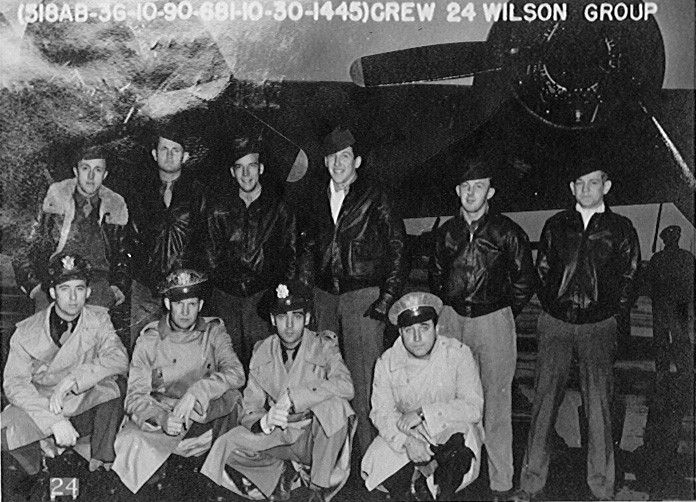
After a period of training they began flying missions near the end of December. On their 4th mission, to Oschersleben Germany, Jan 11 1944, they were shot down. All 10 crewmembers made it out of the aircraft and became POWs at Stalag Luft I, Barth, Germany. They were liberated by the Red Army on May 1, 1945.
After the war Lt. Walker remained in the Army Air Corp. My knowledge of his post-war activity is sketchy. I believe the Army sent him to school for post-grad work in mathematics and physics, after which he worked on missile programs. When the U.S. Air Force became a thing he switched to that branch. He split time between his wife’s family home in the San Joaquin Valley of California and a home in Manhattan Beach, CA, which was near the defense contractors with which he worked. His oldest son told me a few years back that he once went to visit his father at work one day and met all the Mercury astronauts. My uncle also worked on the Atlas program. That about exhausts my knowledge on that subject. Major Walker retired from the Air Force in the nineteen sixties to live at the family home in the San Joaquin Valley. He passed part of his knowledge along to the next generation as a teacher of math and physics (I think) at a local community college. He enjoyed his hobbies of pyrotechnics, winemaking and distilling spirits. I understand he got his first experience in the latter activity during his time as a POW. He passed away too young in 1972.
Now for my father. Delmer W. Deardorff joined the army in early April, 1942 at Monterey, California. He was sent to Camp Roberts, at Paso Robles, for what I take to be combined basic and advanced infantry training. After that he was assigned to an M.P. unit in Oakland for a while. So he didn’t ship out for the Pacific until January 1943. He was assigned as a replacement to Co. F, 2nd Battalion, 128th Infantry Reg., 32nd Infantry Division, which had lost about half its men during the Buna campaign on New Guinea. After another period of training the division went back to New Guinea. My father’s regiment took part in the Saidor and Aitape campaigns on that island. In November, 1944, the 32nd landed on Leyte, Philippine Islands, where they took part in bitter fighting through the end of the year. Sometime before Christmas 1944 F Company was cut off in the mountains of Leyte without supplies. Private Deardorff was declared MIA and his family was notified. He was recovered and hospitalized on Jan 3, 1945. In March 1945 he arrived at Madigan General Hospital at Ft. Lewis Washington. He remained there recovering from his physical ailments until April 1946.
I know little of the time after my father left the service. He returned to his parents’ home in eastern Oregon for a while. He qualified for disability payments. He was physically unable to do the kind of work he did before the war, which was ranching and logging. At the hospital they gave him training in clerical work of some type but, as is typical for PTSD sufferers, he had a hard time with that kind of work environment. He also had problems with addictive behavior. At some point he went to northern California. I am guessing he live with his younger sister and her husband there. That is where he met my mother, a divorced mother of three daughters. They married in 1951 and I debuted in February 1952. Within a couple years the family packed up and returned to Baker, in eastern Oregon. That is the scene of my earliest memories. Few of those involve my father because he still suffered from the tropical disease and trauma he suffered in New Guinea and Leyte Islands, and spent a lot of time in the hospital. He passed away February 25, 1958, a week after my 6th birthday. My mother had had enough of eastern Oregon at that point so we went to southern California for a new start. We lived briefly with my uncle, Major Walker, in his Manhattan Beach home and then my mother took me and the daughter still living at home to begin again on our own. We live in Manhattan Beach until 1966.
Here is a picture of my father in all his glory taken in April 1942, when he left for the army. Then a photo he had taken a few months later.
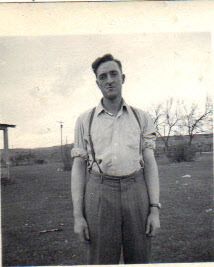
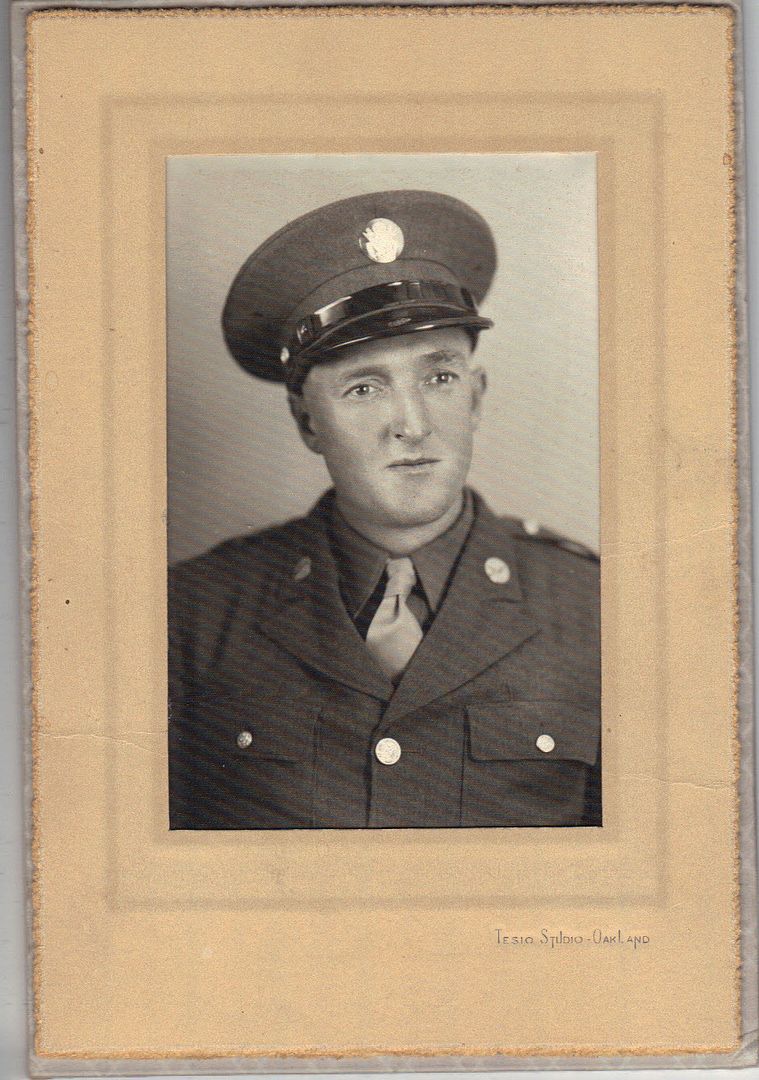
The following is the last photo of him I know of, followed by a picture of his headstone at the cemetery at Durkee, Oregon. I was startled when I first noticed last week that the headstone is inscribed with the wrong Company. I guess after posting all those letters with Co. F in the return address I was more inclined to notice such a thing.
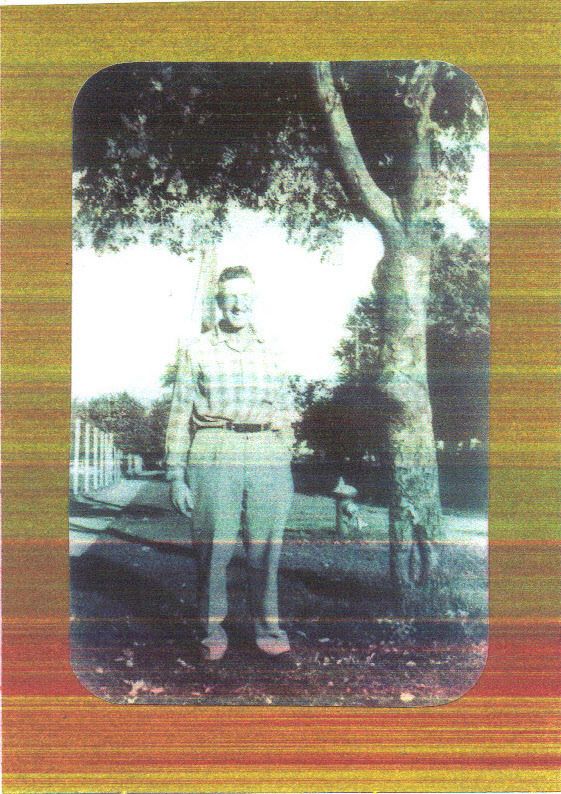
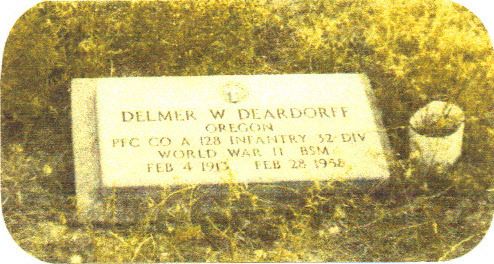
Here is a collection of his insignia and ribbons that survive.
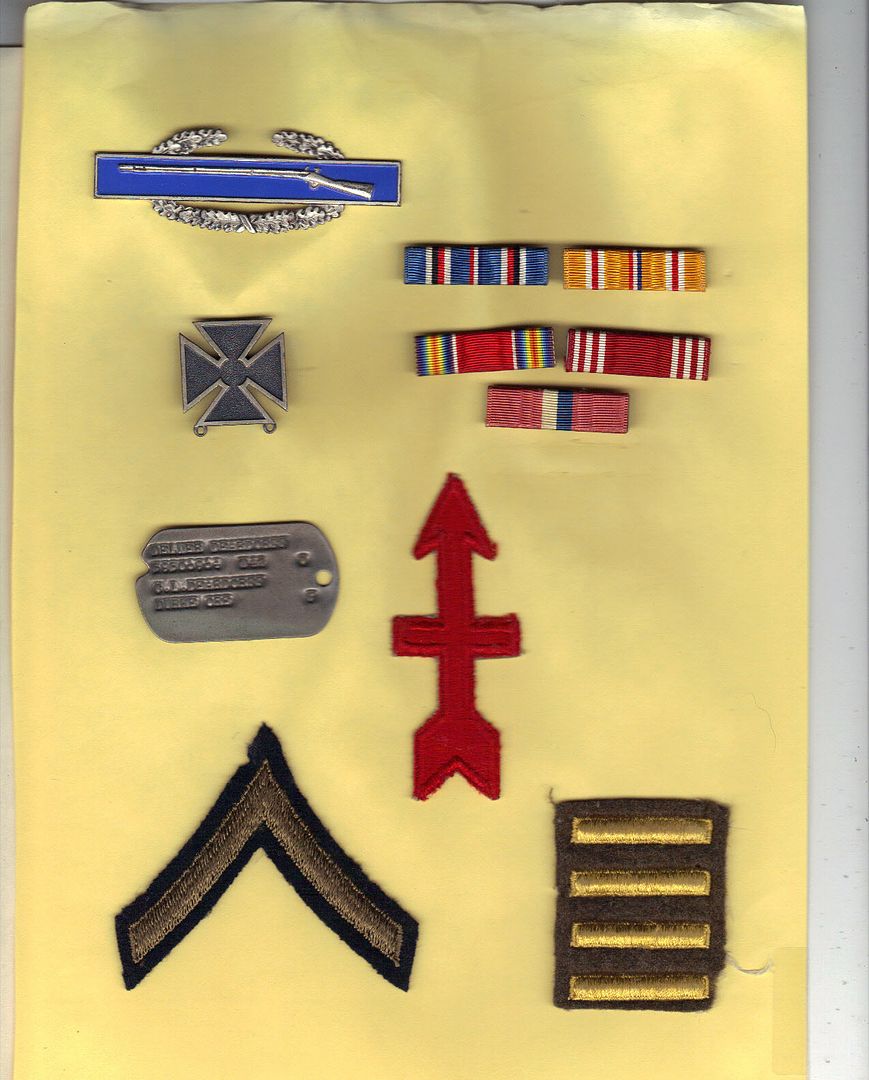
Finally, you may recall that most of the letter my father wrote, or at least the ones I have, were addressed to C.L. Deardorff. Here is a picture of that gentleman with his only grandson, circa 1960.
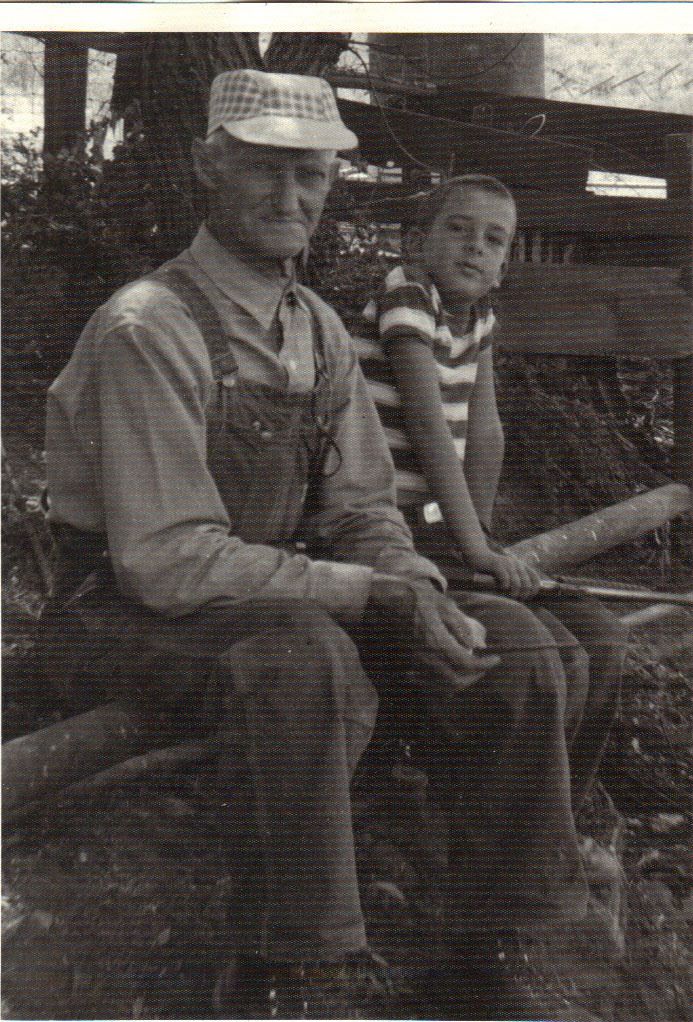
I have some general thoughts on the war I might share, but that will have to wait for another post. If anyone has questions about this project or whatever, ask away.
95 posted on
09/09/2015 12:56:38 PM PDT by
Homer_J_Simpson
("Every nation has the government that it deserves." - Joseph de Maistre (1753-1821))
To: Homer_J_Simpson
Here we are 70 years removed from those events. What was so much a part of all of our childhoods is a dimming memory. Many families had gaping holes torn in them by death and disability. Our parents, grandparents, aunts and uncles told us often of those terrible times.
But we endured, and we prospered. That’s quite a legacy for our antecedents. They would be proud.
And that’s why I have faith in the future for our country and way of life.
96 posted on
09/09/2015 1:06:30 PM PDT by
abb
("News reporting is too important to be left to the journalists." Walter Abbott (1950 -))
To: Homer_J_Simpson
Thank you for sharing that. It actually answers far more questions than it begs. I’d be happy to read your other observations.
97 posted on
09/09/2015 1:16:17 PM PDT by
henkster
(Ms. Clinton, are you a criminal or just really stupid?)
To: Homer_J_Simpson
I miss the daily routine of opening up the WWII 70 years thread each morning and don’t like going through withdrawal.
This ping is a “bit of the hair” and has brightened my day!
To: Homer_J_Simpson
Thank you for sharing that.
One of my Dad’s best friends was in the Pacific and he died in 1960 at age 41. I don’t remember the circumstances but Dad said he had it rough.
God bless them all.
99 posted on
09/09/2015 1:29:26 PM PDT by
laplata
( Liberals/Progressives have diseased minds.)
To: Homer_J_Simpson
Thanks for summing that up. It seems that all of us of a certain age have similar stories.
Your father was a victim of the war as much as my uncle killed on a beach on Leyte.
Thank you for doing this. It makes them live just a bit longer. Hopefully, there are those younger than us who can keep some of the stories alive.
Lets hope that our great grandchildren do not have to hear of their grandparents stories.
To: Homer_J_Simpson
An intensely interesting post, Homer.
As you might have noticed from my postings throughout many months I love the personal and family stories most. How they were effected. Their real experiences.
While my forebears were involved in America’s wars going all the way back to the first conflicts with the Indians in Tidewater Virginia, and in Massachusetts, and elsewhere, and in the Revolution, the War of 1812, and the Civil War, my immediate family landed between generations in World Wars I and II. One of my grandfathers was in his forties in the Forties, and died very young, during the war. The other was a married man in his thirties with children and a farm. As such, it was unlikely he was ever going to war. My dad was born in ‘32, so he was only a young teen during the war. He ended up serving in Korea.
The only family member that served was my great uncle Jim, who married my great aunt on my Dad’s side. He served throughout the North African campaign, Sicily, and the horrendous, long and bloody fight up through Italy. He only talked with me once about it, and that was without much detail. He did make it clear to me that it was at times a living hell, though.
To: Homer_J_Simpson
Thanks for your personal sharing. Personal sharing by you and others is one of many things that made these threads so interesting. I look forward to reading your other observations.
Just curious, but I don't see a Purple Heart ribbon. Surely that gave your father that medal?
To: Homer_J_Simpson
Thanks very much for the wrap-up. Was your uncle your father’s brother? Different last names.
110 posted on
09/09/2015 2:26:48 PM PDT by
Tax-chick
(I want to live my cat's life.)
To: Homer_J_Simpson
116 posted on
09/09/2015 4:48:19 PM PDT by
Squantos
( Be polite, be professional, but have a plan to kill everyone you meet ...)
To: Homer_J_Simpson
To: Homer_J_Simpson
Homer, thanks again for all of your hard work and dedication to this project. I know it was a labor of love for you, and you have my deepest gratitude for sharing your work with fellow FReepers.
118 posted on
09/09/2015 6:44:01 PM PDT by
TADSLOS
(A Ted Cruz Happy Warrior! GO TED!)
To: Homer_J_Simpson
I dont wish to sound repetitious, but thanks, thanks and again, thanks for all you did.
I will miss this thread/topic and all those who contributed to it.
I hope to revisit this topic from time to time.
God bless you.
To: r9etb; PzLdr; dfwgator; Paisan; From many - one.; rockinqsranch; 2banana; henkster; meandog; ...
I don’t have anything new or profound to add to the existing 70-years-worth of analysis of World War II on its meaning or impact on the world, but I am the world’s foremost authority on one particular subject: The making of my project. So I will provide some of the back story on how it came about. Think of this as -
World War II + 70 Years: Disc LXXXIII, Special Features.
Way back in the 1970’s I first read Herman Wouk’s two volume novel of World War II, ‘The Winds of War’ and ‘War and Remembrance.’ I enjoyed them enough that I reread them several times over following decades. I wondered at the way Wouk managed to get his hand full characters directly involved in so many of the key events of the war so at one point I created a timeline to illustrate just how improbable it was. I decided it was not impossible however, even if the younger son of the hero got a lot of leave for a navy line officer in wartime. Anyway the key thing for our project is that I now had an interest in the war, which built on the experiences of my family members, a general idea of the course of the war, and the idea of a timeline.
When my mother passed away in 1990 I first learned of the letters my father wrote during the war and that I eventually posted. I decided to transcribe the letters and assemble them in a binder. To fill it out a little I decided to find some headlines from the newspapers of the time to mark some of the historic points during the series of letters. Like the fall of Corregidor, the battle of Midway, D-Day, and so on. As long as I was at the library looking at microfilm I checked out the New York Times front page for Dec. 1, 1939, to compare it with what Wouk had included in his novel for that day. It matched, of course, and for some reason that tickled me and the memory remained. On that day I discovered how entertaining it was to scroll through old newspapers reading stories of important events and trivial incidents, reading ads, visiting the sports section and getting first impressions of movies that are now old classics. I left the library hooked on microfilm.
I was slow to catch on to the internet and it wasn’t until 2000 that I began to surf on a regular basis. Somehow I found my way to freerepublic.com during the presidential campaign and the ongoing debate between libertarians (which I was then but am not now) and traditional conservatives. I liked it here and soon signed up as a freeper. I noted that in addition to links and discussion of current news there were threads devoted to honoring service personnel and marking important days in history.
Over the next several years the factors I have laid out here percolated in my subconscious and finally formed into the idea of doing a real-time series on the war. I read William Shirer’s ‘Rise and Fall of the Third Reich’ and Toland’s ‘The Rising Sun: The Decline and Fall of the Japanese Empire,’ and entered dates they contained on my timeline so I could post excerpts when the time came. I got a copy of Volume 1 of Churchill’s memoirs and did the same. Ditto for a few other books. I moved the start of my timeline back to 1935 as I read the history, but it seemed there were not enough events leading to war to populate a day-by-day account of the type I envisioned so I didn’t get around to actually posting stuff until 1938/2008.
I was at such a rudimentary level of posting skill at the time that I didn’t know how to create and save a jpeg image and then post it with the proper html coding. That left me having to transcribe articles manually and then copy/paste them to start new threads. That took an enormous amount of time and severely limited the amount of material I would be able to post. It also eliminated the valuable benefit of seeing how the articles appeared in the original version and made the inclusion of photographs and advertisements impossible. Luckily for all of us CougarGA7 came to the rescue and gave me a quick course on posting photos. That was mid-1938.
As I expected, the first time I posted an article with the source identified as New York Times I set off bells and sirens and the article was promptly pulled. After a discussion with admin moderator our wise and benevolent leader Jim Robinson was called in and pronounced that, since the articles were 70 years old they were public domain and therefore acceptable for posting. For a long time after that I waited apprehensively for a notice from a lawyer for the Times ordering me to cease and desist, but it never came. I will always be grateful to Mr. Robinson for allowing me to begin this project on his site, when it , and for continuing to allowing me to fill up his servers with World War II news. I have been unemployed for most of the time and have lacked the fund to both donate during freepathons and pay for the copies ($0.25 ea.) that come from the microfilm. I hope a few satisfied readers have been inspired to donate because of my project.
Another early controversy concerned the titles of the articles. I wanted something distinctive that would make clear that the articles were connected and part of a series. I settled on “Real Time + 70 Years” as an appendage to whatever the title of the article was. I soon discovered that nothing is so insignificant that it won’t generate outrage from some quarter, and my use of “Real Time” actually became a distraction when a few freepers saw it as a misuse of the term and wouldn’t rest until I recognized my error. They actually did me a favor since I just gave up and put the date of the newspaper in parentheses after using the main headline as the thread title. That makes the articles easier to find and uses fewer of the 100 characters available for thread titles.
And so I began posting articles on January 27, 2008 with this modest and unwarlike story:
1,500 STORM THEATRE TO RECEIVE GOODMAN
I intended this to be an educational project as well as entertaining. Otherwise, why spend all the time and bandwidth on it? My thinking then was that the first and most important lesson we could learn from the war was how it could have been prevented, that we might know how to prevent future wars. There was plenty of discussion of the prewar period, as we watched the Munich Agreement, Kristalnacht, the absorption of Czechoslovakia into the Reich, up to the Molotov-Ribbentrop agreement on the eve of war. In all that time I never felt like we had put our collective finger on the one thing, or set of things, that could have been done to stave of the catastrophe. So the war began and our moment to find the key to peace passed, as it did in the original. I let it go and settled down to observing the war. I often felt a twinge of guilt over my fascination since I was definitely having fun and the source of the fun was so horrible and involved such suffering.
Another observation from viewing the war in real time (if that usage bothers you, tough) is how long the intervals between major events seem. My view of the war after Pearl Harbor was that, first the surprise attack came and then it was just one damn thing after another until Coral Sea and then after a brief pause, Midway. But in 2011 and 2012 it seemed like a long haul between the losses of December and the fall of Corregidor. It must have been an agonizing time for those involved. I got the same impression for other phases of the war. Even when the Allies were winning.
As American industrial capacity began to gain traction and slowly began to turn the tide in the Pacific and Europe, I began to realize that my assumption about the opportunity to learn the lesson of how to prevent future wars might have not been in the prewar period at all but from the exercise of American power during the war. henkster frequently hinted at what was coming and then we could observe for ourselves as the materiel rolled off the assembly lines and out of the shipyards in quantities that made a mockery of the pitiful Axis dreams of eventual conquest. Most of the human suffering – for Americans, at least – took place after this inevitable turn of the tide. Perhaps if, the American industrial and military potential had been made clear to Hitler, Mussolini and Hirohito, and American leadership had convinced the Axis partners in no uncertain terms that we would destroy them utterly if they dared attack us, then maybe history would have taken a different turn.
But then anyone who took received at least a C- in this class knows that henkster’s law makes that scenario impossible. America was an isolationist nation in 1939 and Roosevelt had to use his prodigious wiles to pull off even token and symbolic warlike acts prior to Pearl Harbor. Still, the lesson of American power and the will to use it remains on the historical record. Maybe if our government, instead of reaching out, seeking mutual aims, striving to understand other cultural points of view, etc., simply told hostile powers that, if they attack us (and we reserve the right to define “attack”) we will use all our might to destroy them utterly, we might have a more peaceful world. That would require different government leaders and a political will among the people that doesn’t exist yet but as I understand it henkster’s law deals with alternative history of the past and not the future. That is why I believe powerful communication skill tops the list of qualities I believe we need in a future president and other political leaders. Because we can elect the right leaders with a narrow voting majority, but the concept of peace through strength needs to be sold to a large majority to be most effective.
So nothing new and profound from your humble facilitator, but that is my main serious takeaway from the project.
I had some personal lessons to learn from the war, too. I mentioned in reply #95 that I didn’t know my father well since he died when I was so young. Through the posting of his letters and following his career as a soldier I believe I have come to know him a little better. I feel I have paid a debt to both him and myself in that regard. I also know a little better what it was like for my other relatives who were alive during the war and understand more clearly how they saw the world.
I want to acknowledge the people who have done so much to make this project more than just a bunch of old newspaper articles. My problem is, where would I stop? Different freepers have stepped up at different periods of the war to contribute according to their own expert or first-hand knowledge. In some cases this period lasted from 1939 to 1945. In other cases light was shed on a single campaign or front. It all enhanced the experience, so thank you, professor level participants.
Others helped me personally without adding any historical context by checking in once or twice to say, “I know I don’t post much here, but I read the posts every day, so thanks for doing the work.” I always got a lift from such a post, even if I didn’t acknowledge it at the time. So thank you for the encouragement.
When I first started the class roster I would sometimes check the posting history when someone new asked to be added. I was surprised at how often it turned out that the request to be added was the only post from that freeper for years. During the war they never posted, and as far as I know they still don’t post. But I respect and appreciate their taking the step of emerging from anonymity for a moment to join the class. I hope it measured up to your hopes and expectations.
Many of you have asked what is next for Homer J now that the war is over. Some have suggested covering the Korean War, or World War I, or even the Civil War in the same manner as this one. The last one would be really interesting to try, but even if I had access to a complete collection of NYT microfilm going that far back I would demur. I am done with this type of project. I sincerely wish that some young freeper with an interest in history and suffering from the same mental disorder as me would give it a go. I will be the first to enroll in the class. I feel the stirring of something different beginning in the back of my mind and maybe it will emerge for FR and all the world to see at some point. Something I don’t think I ever mentioned as part of this course (since it isn’t directly relevant) is that in 2002 I “swam the Tiber,” as the saying goes, and switched from being a confirmed-then-lapsed Episcopalian to a member of the Roman Catholic Church. From then until I got so deeply immersed in this project that it took most of my free time I explored different areas of the Magisterium – the Catechism, Holy Scripture, church histories, biographies, and so on. I realized a person could spend a lifetime, heck, several lifetimes, in such a pursuit and never see it all. It is likely that any new publicly displayed efforts like the WWII project will involve that route to the Kingdom of God.
In the meantime, I’m not going anywhere, so I look forward to encountering many of you on various Free Republic threads in the future. And I wait with eager anticipation to learn who will be posting the Civil War threads. Say, aren’t the Lincoln-Douglas debates going on about now?
130 posted on
09/12/2015 10:19:43 AM PDT by
Homer_J_Simpson
("Every nation has the government that it deserves." - Joseph de Maistre (1753-1821))
To: Homer_J_Simpson
THANK YOU Homer!!
Quite possibly the GREATEST running thread in FR history!
You deserve a break Homer, have one on me.
182 posted on
09/18/2015 3:20:26 PM PDT by
mowowie
(`)
FreeRepublic.com is powered by software copyright 2000-2008 John Robinson






